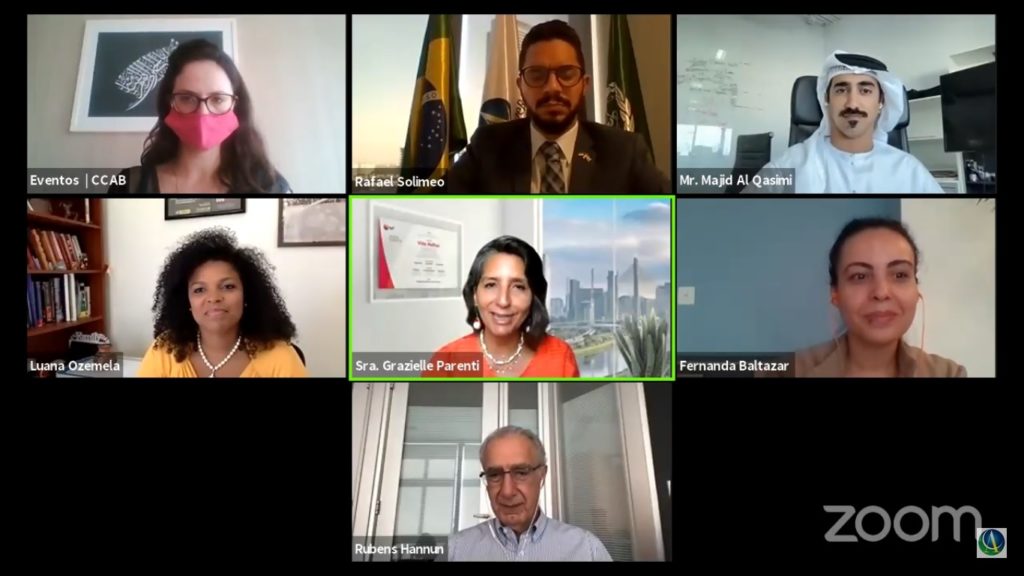São Paulo – Partnerships for education and research into agricultural technology is an opportunity for Brazil to do more business with the Arab countries. During a webinar hosted by the Arab Brazilian Chamber of Commerce (ABCC) this Wednesday (27), Majid Al Qasimi, a partner at UAE consulting firm Soma Mater, said the region is shifting its focus towards domestic food production, with research and development being done to that end. “Education in farming technology is becoming more widespread, in the public and private sectors,” he said.
According to Al Qasimi, there are opportunities available to Brazil including in agricultural R&D, in bilateral R&D funds, and an educational curriculum on farming, so that Arab countries can grow their own food.
Al Qasimi also said the normalization of relations with Israel and Qatar have been key in creating stability in the region, so that continuous development can take place.
Luana Ozemela of Brazil, the CEO of Qatar-based Dima Consult, was also a speaker in the webinar. “We are in an extraordinary moment in the history of Qatar,” she said. According to her, the outlook for 2021 is promising due to the normalization of relations with neighboring Gulf countries, and this builds global market confidence. Ozemela notes that Qatar is looking to attract some UDS 25 billion in investment, create 10,000 jobs and bring more than 1,000 enterprises into the country by 2022.
She argues that despite all the problems, the blockade led Qatar to work harder towards self-sufficiency in food security. “Qatar grew more independent, it diversified its economy, it found new international allies, and now that the blockade is over, it is looking to welcome its partners at its home,” Ozemela said.
According to her, Qatar intends to become a food distribution hub spanning the Gulf, Africa and Asia. “The infrastructure is ready,” argued Ozemela. Qatar’s population is increasingly aware of health and sustainability, and Brazil’s healthy snack industry could be successful here.
Regarding the 2022 FIFA World Cup, which Qatar is slated to host, 1 million fans are expected to descend on the country. Ozemela said the infrastructure is under construction, including 16 new hotels. “FIFA projects alone will entail UDS 20 billion to USD 30 billion in spending this year,” she said.
The webinar “Food security challenges and market opportunities for the Brazilian food industry in the Arab Countries” was hosted by the ABCC in partnership with the Brazilian Food Industry Association (Abia). It also featured Abia’s board chair Grazielle Parenti and ABCC Dubai office head Rafael Solimeo.
Parenti said the year of 2020 posed a huge challenge to Brazil’s food industry, and it proved capable of keeping both the domestic and foreign markets supplied. “This attests to its resilience at the local and global levels, and to the credibility that Brazil enjoys with its international clients,” she argued;
Parenti also discussed sustainability. “The Brazilian industry employs the best practices, and we have sensed that same demand from Arab countries, this whole concern with finding organic, sustainable, traceable, certified product. We are on this path together,” she said.
She also mentioned that food industry companies are tending towards internationalization. “Many companies are setting up offices and plants in Arab countries in order to relay their expertise and also to be present at the local level,” Parenti said.
Solimeo discussed the services available from the ABCC, and ABCC president Rubens Hannun kicked off and wrapped up the event. Hannun went over the possibility of partnerships with the Brazilian Agricultural Research Corporation (Embrapa) and with universities in Brazil for cooperation and knowledge exchange in farming. The webinar was moderated by ABCC Institutional Relations manager Fernanda Baltazar.
Translated by Gabriel Pomerancblum




